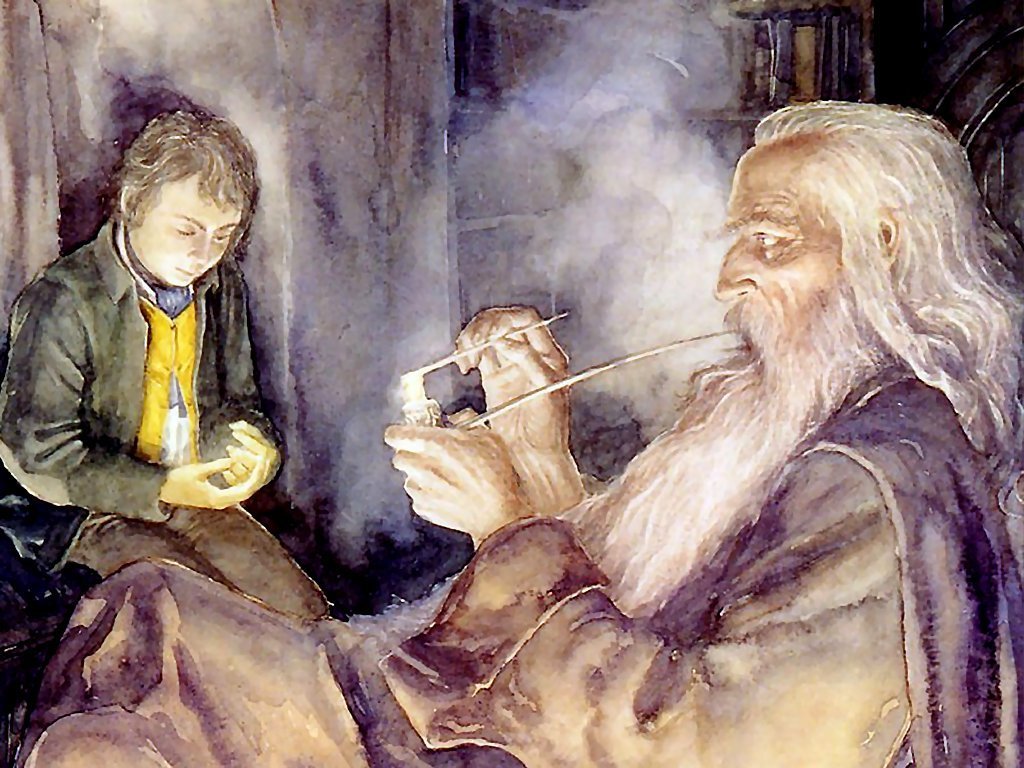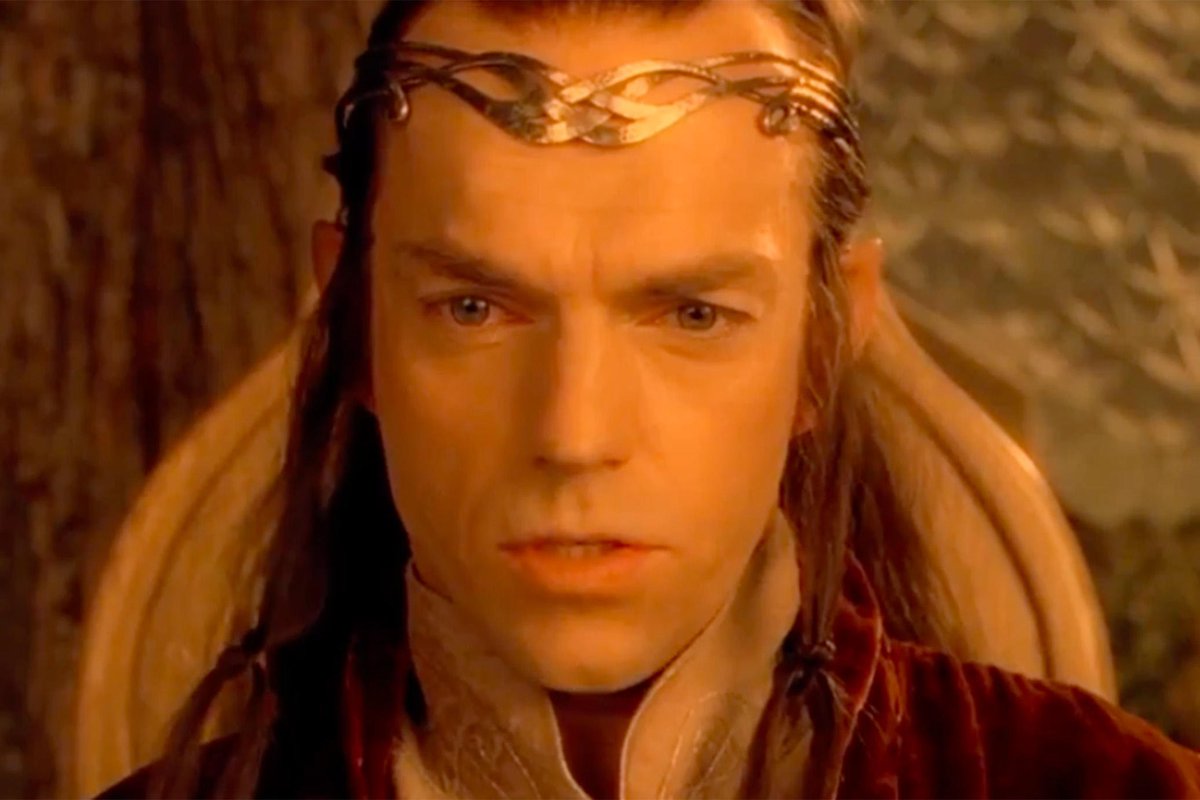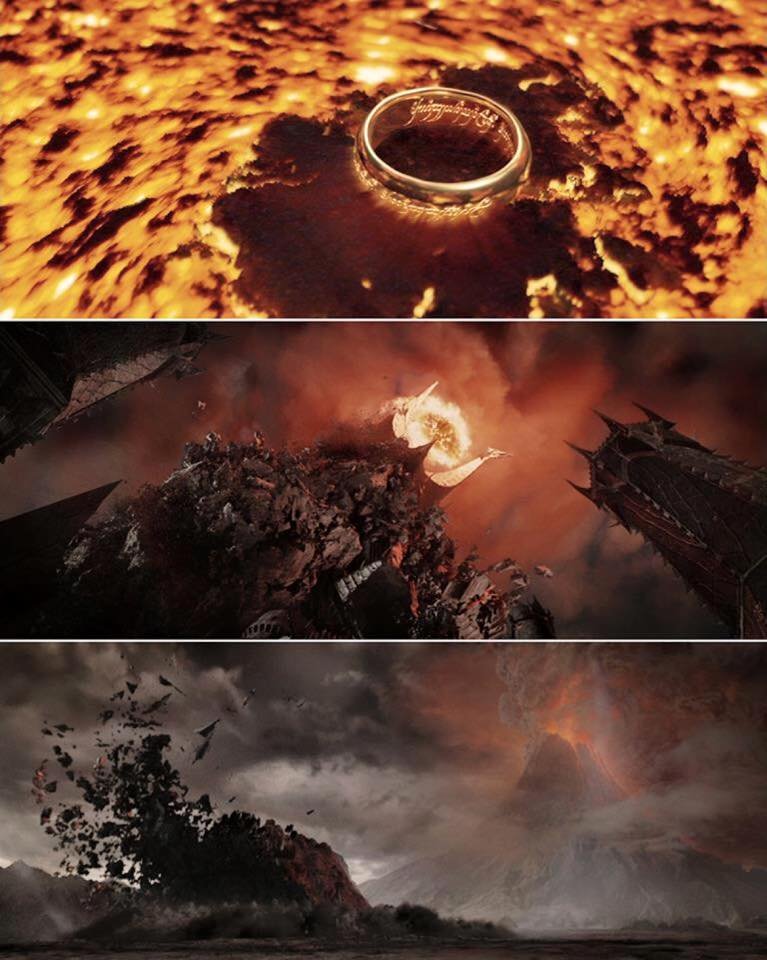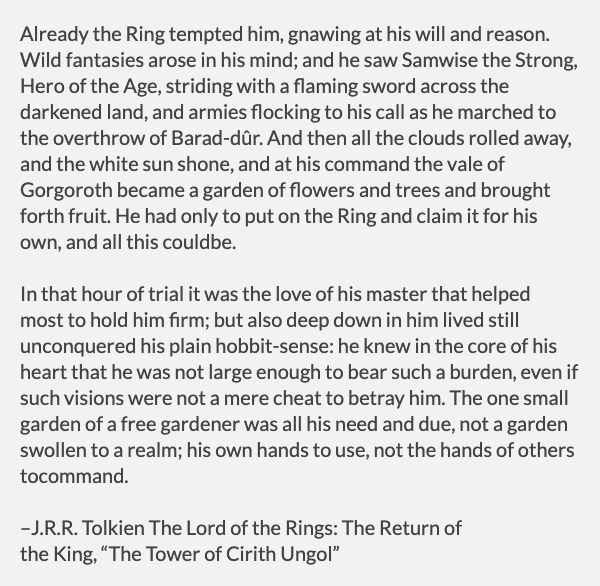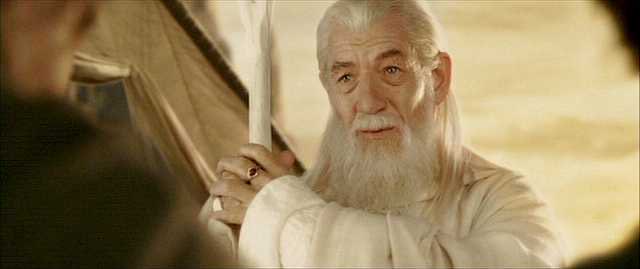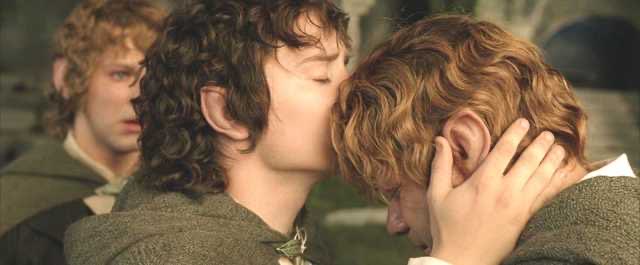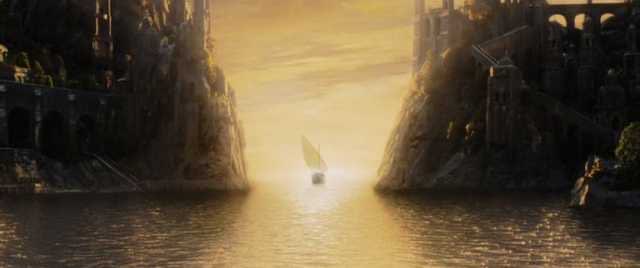Might try to do a Tolkien-ian thread for the duration of self-isolation. Maybe some Boethius too.
The Sackville-Bagginses in the Hobbit and LotR were inspired by Tolkien's relatives on his mother's side: The Suffields; who disowned his mother Mabel when she converted to Catholicism. Tolkien blamed them for his mother's early death from diabetes.
"the general opinion was that Bilbo, who had always been rather cracked, had at last gone quite mad, and had run off into the Blue. There he had undoubtedly fallen into a pool or a river"
Funny, that's what happened to Isildur and Drogo, the other ring-finders.
Funny, that's what happened to Isildur and Drogo, the other ring-finders.
"Sméagol" is derived from the Anglo-Saxon sméagan (to scrutinize, investigate, penetrate, examine), and its adjectival form sméah (sagacious, sharp, crafty, subtle)
-Jane Chance, Tolkien the Medievalist
-Jane Chance, Tolkien the Medievalist
...Tolkien's first idea was that Déagol should find the Ring at the roots of a riverside thorn tree, thus associating the Ring with roots and also with magic (thorn trees and magic are associated in Anglo-Saxon charms...)
Smeagol was interested in "roots and beginnings" and wonders how deep the roots of a mountain would be.
Bilbo just wants to climb mountains.
Bilbo just wants to climb mountains.
‘I wish it need not have happened in my time,’ said Frodo. ‘So do I,’ said Gandalf, ‘and so do all who live to see such times. But that is not for them to decide. All we have to decide is what to do with the time that is given us'
Even Gollum was not wholly ruined. He had proved tougher than even one of the Wise would have guessed – as a hobbit might. There was a little corner of his mind that was still his own, and light came through it, as through a chink in the dark: light out of the past.
It was actually pleasant, I think, to hear a kindly voice again, bringing up memories of wind, and trees, and sun on the grass, and such forgotten things.
Gandalf sighed. ‘Alas! there is little hope of that for him. Yet not no hope.
Gandalf sighed. ‘Alas! there is little hope of that for him. Yet not no hope.
Bilbo's pity for Gollum, became Gandalf's hope, which became Frodo's mercy for Gollum in Two Towers, which ended up saving Middle Earth in the end.
Cannot be emphasized enough. No one is beyond hope. And that's an encouraging thought.
Cannot be emphasized enough. No one is beyond hope. And that's an encouraging thought.
"there was nothing more to find out, nothing worth doing, only nasty furtive eating and resentful remembering. He was altogether wretched. He hated the dark, and he hated light more: he hated everything, and the Ring most of all"
Huh..sounds like some people we know now.
Huh..sounds like some people we know now.
A lesson: Gollum's curiosity turned into an appetite, the appetite turned into an addiction, the addiction turned into bitterness.
Gandalf: 'Saruman has long studied the arts of the Enemy himself, and thus we have often been able to forestall him. It was by the devices of Saruman that we drove him from Dol Guldur.'
A note: Tolkien meant Saruman's 'devices' to be primitive cannon, not dynamite.
A note: Tolkien meant Saruman's 'devices' to be primitive cannon, not dynamite.
Saruman is the most modern character in the Lord of the Rings, a character most 20th century contemporaries would have recognized: a politician.
Saruman's name is derived from Searu in Old English (the West Saxon form of Mercian *saru) means ‘Device, design, contrivance, art’
The word stretches from wisdom to plot and treachery, it implies cleverness, but is nearly always linked with metal.
The word stretches from wisdom to plot and treachery, it implies cleverness, but is nearly always linked with metal.
Jewellers are searo-cræftig, and wizards snottor searu-þancum, ‘wise in cunning thoughts’. Beowulf denies he ever sought out searo-niþas, ‘cunning malices’,
The dragon’s treasure is a searu-gimma geþræc, ‘a heap of cunning jewels'
The dragon’s treasure is a searu-gimma geþræc, ‘a heap of cunning jewels'
Saruman’s Orc-men call him ‘Sharkey’ or ‘Old Man’.... ‘cunning man’, or ‘machine man’, or ‘technological man’, keeps a Utopian carrot dangling in front of our noses, of a world of leisure and convenience where each new mill grinds faster than the one before
Denethor of course, can be recognized by 20th and 21st century contemporaries as another modern character: a conservative.
Or let us say, an arch-conservative. Consider his words:
Or let us say, an arch-conservative. Consider his words:
Denethor: I would have things as they were in all the days of my life . . . and in the days of my longfathers before me: But if doom denies this to me, then I will have naught: neither life diminished, nor love halved, nor honour abated
But back to Saruman. When we first meet him he tries to convince Gandalf to join with Sauron, as he himself has joined with a power that is unbeatable.
When Gandalf refuses, Saruman tempts him with even greater power, insinuating that they together could overthrow Sauron
When Gandalf refuses, Saruman tempts him with even greater power, insinuating that they together could overthrow Sauron
Tolkien saw some of himself in Saruman, and Feanor, men of great thought and seekers of knowledge, men who sought to sub-create, but fell into evil.
Frodo speaking about Saruman: "He was great once, of a noble kind that we should not dare to raise our hands against. He is fallen, and his cure is beyond us; but I would still spare him, in the hope that he may find it."
Tom Shippey: In the pursuit of control Saruman is prepared to co-operate with evil, which he thinks he can use for his own much more admirable purposes, and later suppress or discard. The failure of beliefs like this is all too familiar from war after war, during the past century
Shippey: If Saruman suggests the technological Utopia turned into squalid dictatorship, Denethor represents the late twentieth-century fear, leaders with a death-wish who have given up on conventional weapons. how fortunate it is that Denethor did not gain control of the Ring!
To this point, an earlier draft of Lord of the Rings had the Scouring of the Shire being done by a new character who would've been an underling of Saruman's. Tolkien perhaps desired to truly pardon Saruman, as a noble character redeemed. https://twitter.com/anangbhai/status/1241900162043252736?s=20
Bilbo: 'Don’t adventures ever have an end? I suppose not. Someone else always has to carry on the story.'
it seemed that the words took shape, and visions of far lands and bright things that he had never yet imagined opened out before him; and the firelit hall became like a golden mist above seas of foam that sighed upon the margins of the world.
Elrond paused a while and sighed. ‘I remember well the splendour of their banners,’ he said. ‘It recalled to me the glory of the Elder Days and the hosts of Beleriand, so many great princes and captains were assembled.
Eärendil was my sire, who was born in Gondolin before its fall; and my mother was Elwing, daughter of Dior, son of Lúthien of Doriath. I have seen three ages in the West of the world, and many defeats, and many fruitless victories.
Aragorn: "Strider" am I to a fat innkeeper, who lives within a day's march of foes that would freeze his heart or lay his town in ruins. Yet I would not have it otherwise. If simple folk are free from care, simple they must be, and we must be secret to keep them so.
I could be wrong but in the books it is not fully explained what happened in the battle between Sauron, Isildur, Elendil, Elrond, and Gil-Galad.
The only direct mention of it from Isildur is in the letter he wrote that Gandalf found in Minas Tirith:
"The Ring misseth, maybe, the heat of Sauron’s hand, which was black and yet burned like fire, and so Gil-galad was destroyed;"
"The Ring misseth, maybe, the heat of Sauron’s hand, which was black and yet burned like fire, and so Gil-galad was destroyed;"
Gil-Galad came into contact with Sauron's hand for him to be burnt, and 'of him the Elven songs sadly sing'.
Elendil and Gil-Galad together destroyed Sauron (how?) and both died in the process, but Elendil's body was intact, and when it fell Narsil broke beneath him.
Elendil and Gil-Galad together destroyed Sauron (how?) and both died in the process, but Elendil's body was intact, and when it fell Narsil broke beneath him.
Isildur stayed by his father's side, as did Elrond by his lord Gil-Galad's side. But it was Isildur who was tempted by the one ring, and so he cut it from Sauron's dead hand with the broken blade of Narsil.
Happy VM Day Tolkien nerds: Victory over Mordor Day.
On this date the One Ring & Sauron were destroyed.
"A great Shadow has departed,’ said Gandalf, and then he laughed, and the sound was like music, or like water in a parched land;"
On this date the One Ring & Sauron were destroyed.
"A great Shadow has departed,’ said Gandalf, and then he laughed, and the sound was like music, or like water in a parched land;"
"and as he listened the thought came to Sam that he had not heard laughter, the pure sound of merriment, for days upon days without count. It fell upon his ears like the echo of all the joys he had ever known"
JRR Tolkien nerds will appreciate that he chose March 25 (The date of the Annunciation and the date of the Crucifixion in catholicism) as the date when the One Ring was destroyed. The Ring quest began on Christmas Day December 25 (when the Ring-bearers left Rivendell)
Eucatastrophe: a sudden and miraculous grace: never to be counted on to recur. It does not deny the existence of sorrow and failure, it denies universal final defeat and provides a fleeting glimpse of Joy, Joy beyond the walls of the world, poignant as grief.
The Elves knew that when the Ring was destroyed, the power of the Three Elven Rings (Narya, Vilya, and Nenya) would also be destroyed. The power that protected Rivendell, Lothlorien, and Gandalf would be undone. And yet they made that choice willingly.
This is the most Tolkien-ian scene in the Hobbit films NOT written by Tolkien himself.
Gandalf: 'Saruman believes it is only great power that can hold evil in check, but that is not what I have found. It is the small everyday deeds of ordinary folk that keep the darkness at bay. Small acts of kindness and love.'
the simple 'rustic' love of Sam and his Rosie is absolutely essential to the study of his character, and to the theme of the relation of ordinary life (breathing, eating, working, begetting) and quests, sacrifice, causes, and the 'longing for Elves'
Tolkien Letter #160
Tolkien Letter #160
Samwise Gamgee was a ring-bearer, for a brief period. But Sam, too was tempted by the One Ring, and saw a vision of himself as the hero remaking the world in his image.
But then the vision subsided. No matter how tempting, Sam just wanted to be gardener.
But then the vision subsided. No matter how tempting, Sam just wanted to be gardener.
"Well, here at last, dear friends, on the shores of the Sea comes the end of our fellowship in Middle-earth. Go in peace!
I will not say: do not weep; for not all tears are an evil.”
I will not say: do not weep; for not all tears are an evil.”
"You must start somewhere and have some roots, and the soil of the Shire is deep. Still there are things deeper and higher; and not a gaffer could tend his garden in what he calls peace but for them, whether he knows about them or not. I am glad that I know about them, a little."
The elves story in middle earth began with Feanor's greed and covetousness.
It ended with Galadriel blessing Gimli the Dwarf that he would never be burdened with those qualities.
It ended with Galadriel blessing Gimli the Dwarf that he would never be burdened with those qualities.
Have ye then no hope?” said Finrod.
“What is hope?” she said. “An expectation of good, which though uncertain has some foundation in what is known? Then we have none.”
“What is hope?” she said. “An expectation of good, which though uncertain has some foundation in what is known? Then we have none.”
That is one thing that Men call ‘hope’,” said Finrod. “Amdir we call it, ‘looking up’. But there is another which is founded deeper. Estel we call it, that is “trust”. It is not defeated by the ways of the world, for it does not come from experience, but from our nature
If we are indeed the Eruhin, the Children of the One, then He will not suffer Himself to be deprived of His own, not by any Enemy, not even by ourselves. This is the last foundation of Estel, which we keep even when we contemplate the End:
Of all His designs the issue must be for His Children’s joy. Amdir you have not, you say. Does no Estel at all abide?”
This is a great war long-planned, and we are but one piece in it, whatever pride may say. And now all realms shall be put to the test, to stand, or fall – under the Shadow.
Yet, Master Peregrin, we have this honour: ever we bear the brunt of the chief hatred of the Dark Lord, for that hatred comes down out of the depths of time and over the deeps of the Sea. Here will the hammer-stroke fall hardest.
Hope and memory shall live still in some hidden valley where the grass is green.
when Aragorn arose all that beheld him gazed in silence, for it seemed to them that he was revealed to them now for the first time. Tall as the sea-kings of old, he stood above all that were near; ancient of days he seemed and yet in the flower of manhood;
and wisdom sat upon his brow, and strength and healing were in his hands, and a light was about him. And then Faramir cried: ‘Behold the King!’
the King passed through the flower-laden streets, and came to the Citadel, and entered in; and the banner of the Tree and the Stars was unfurled upon the topmost tower, and the reign of King Elessar began, of which many songs have told.
In his time the City was made more fair than it had ever been, even in the days of its first glory; and it was filled with trees and with fountains, and its gates were wrought of mithril and steel, and its streets were paved with white marble;
after the ending of the Third Age of the world into the new age it preserved the memory and the glory of the years that were gone.

 Read on Twitter
Read on Twitter